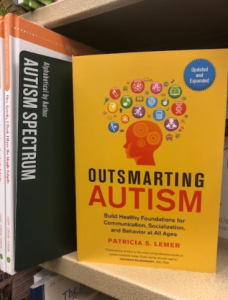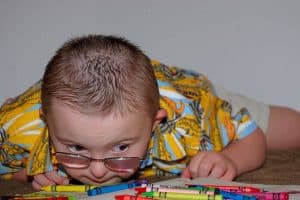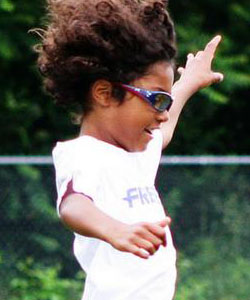If you are a parent of a special needs child, then by now you have realized that nothing fully prepares you for this unique journey.
Public school data in the USA now shows that up to 14 percent of all public school students ages 3 to 21 receive special education services— but this statistic doesn’t even account for all children with special needs, as many are educated privately.
Among the special education population is a wide range of special needs that can generally be divided into four categories:
- Developmental — Down syndrome, autism, dyslexia, and processing disorders
- Behavioral/Emotional — ADHD, mental health, or oppositional defiant disorder
- Physical — Muscular dystrophy, multiple sclerosis, chronic asthma, and epilepsy
- Sensory Impaired — Blind, visually impaired, deaf, or hearing-impaired
Vision conditions and special needs
Did you know that 35 areas of the brain are involved with visual information processing— and up to 80 percent of the sensory information that arrives to the brain is through the visual system?
This infers that a deficit in any area of the visual system can create significant challenges for a child.
However, research also shows that an even higher percentage of children with special needs may have vision problems that are undiagnosed because their associative behaviors are perceived as part of their special needs diagnosis.
It is therefore crucial for parents and caregivers to understand the importance of bringing a child with special needs for eye exams to comprehensively assess both their vision and the functioning of the visual system.
In actuality, children with special needs tend to have higher incidences of the same vision problems that affect neurotypical children.
These visual problems may include:
- Nearsightedness (myopia)
- Farsightedness (hyperopia)
- Eye turns (strabismus)
- Eye focusing
- Lazy eye (amblyopia)
- Eye teaming and tracking
- Binocular coordination (stereo vision)
- Depth perception
- Visual information-processing
Red flags of a vision condition
If you have a child with special needs it is crucial to be able to identify the red flags that may indicate a vision condition:
- Omits/skips/repeats small words or lines when reading
- Holds reading material too close
- Tilts head/closes one eye when reading
- Reduced visual attention or avoids reading all together
- Avoids near work
- Poor reading comprehension
- Difficulty copying from board
- One eye turns in or out (Strabismus)
- Unable to listen and look at same time
- Messy handwriting
- Visual perceptual problems
- Clumsy or prone to tripping
- Unusual neck and body postures
- Motion sickness
- Uncontrolled eye shaking (Nystagmus)
If any of these red flags sounds like your child, contact an eye doctor near you to detect any vision conditions your child may have.
How do vision problems impact daily life for children with special needs?
It is not uncommon for children with special needs to demonstrate certain behaviors that may be perceived as a symptom of their specific diagnosis— the fact is, vision problems can actually cause, or exacerbate behaviors common among children with special needs.
Vision problems can add to a child’s challenges— affecting behavior, interfering with reading and learning performance, and impacting daily routine tasks.
Schedule an eye exam to get your child’s vision checked to make sure they don’t have an undiagnosed vision problem.
SEE RELATED: Vision and Autism
Eye exams for children with special needs
Children with special needs usually have higher optical prescriptions, and specific equipment may be required to provide the correct prescription— many special needs children have reduced visual acuity or may even be non-verbal.
A comprehensive assessment of children with special needs usually requires a developmental vision evaluation to examine the integrity of visual skills.
If reduced vision or visual skills are detected, corrective eyewear and/or a personalized program for vision therapy will be recommended. Early identification of vision conditions are essential to achieve optimal treatment results— allowing children to reach their highest potentials.
Eyeglasses for children with special needs
Eyeglasses for children with special needs are designed with special features to accommodate facial features unique to some children with special needs.
For example, children with Down syndrome have a unique shaped face which may make it difficult to fit them for eyeglasses. However, with custom fit eyeglasses, the bridge of the eyeglass frame can be adjusted to fit on their nose, and the temples can be modified to keep the glasses from constantly slipping down. Frame designs also include lightweight plastics and flexible materials.
Multiple options for optical lenses such as hi-index lenses, photochromatic lenses, and bifocal designs are available as well, which will provide optimum comfort and vision.
While eyeglasses or vision therapy won’t solve every issue that a child with special needs encounters, they can help treat underlying vision problems that contribute to some negative symptoms and behaviors.
Vision therapy for children with special needs
Extensive research and clinical trials has shown that vision therapy is an effective program to improve the visual skills needed to achieve clear and comfortable vision.
Each therapy program is fully customized to enhance and strengthen visual skills, and re-train the child’s visual system to interpret visual input with increased accuracy and ease. Vision therapy is more than just simple eye exercises— it improves brain-eye communication, and the effective operating of the child’s visual system.
The aim of vision therapy is to enhance the skills necessary for clear and comfortable vision, such as:
- Eye-tracking
- Eye teaming
- Focusing
- Hand-eye coordination
- Visual processing speed
Vision therapy may involve the use of lenses, prisms, filters, occluders, and other equipment as part of the training program. In recent years, advanced technologies and new computer-based therapies such as vision therapy apps have turned traditional vision therapy exercises into fun and interactive activities.
Vision therapy can enable your child with special needs to understand their surroundings with greater certainty and consequently improve associated behaviors such as anxiety, social skills, and verbal skills.
How can your child with special needs benefit from eye care?
Children with special needs struggle with multiple challenges that can make academic and life achievements seem almost impossible to conquer.
However, with identification and resolution of underlying vision problems, these children will be given a greater chance to achieve what their families may have thought would never be possible. Eye care, including eyeglasses and/or vision therapy, can facilitate learning performance, as well as the ease of everyday tasks— minimizing the challenges that both you as the parent, and your child, face on a daily basis.
If your child has special needs and displays behaviors that may be related to a vision condition, schedule a comprehensive eye exam of both their vision and visual skills.
LEARN MORE: Vision for Special Needs
A proper diagnosis and treatment program can help to improve your child’s quality of vision— providing them with clear and comfortable vision for improved quality of life.









